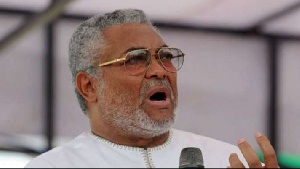Opinions of Monday, 7 May 2018
Columnist: Kwaku Badu
The bizarre mindset of the supposedly social democrats (I)
The story is told, in a historical standpoint, that former President Rawlings founded the National Democratic Congress (NDC) based on the principles of probity, accountability and transparency. And yet unbridled sleazes and corruption pervaded every facet of the successive NDC governments.
Anecdotally, we have been informed that before the formation of the NDC in 1992, the founder of the NDC (Rawlings) and his minions vowed to purge off the alleged widespread sleazes, corruption and social injustices in the country which instigated their coup d’état in 1979.
And in their hasty attempts to lustrate the country of the perceived maliciousness and injustices, they carried out what they termed “house cleaning exercise”,--they dealt with perceived offenders capriciously (instant justice).
The disgruntled coup makers proceeded with their intentions and callously exterminated eight prominent officers, whom they accused of committing sleazes and corruptions without trial.
Regrettably, however, if we juxtaposed the alleged corrupt practices of the murdered army officers with the sleazes and corruption which took place in the erstwhile NDC administration, we cannot help but to admit that the Generals were “shot for less”.
The sleazes and corruption, as a matter of fact, permeated every department of the erstwhile NDC administration, and hence earning the famous appellation, ‘create loot and share’.
Apparently, the ‘create, loot and share’ phraseology was contained in the verdict of JSC Dotse in Amidu versus Woyome.
In fact, the sleazes and corruption were so prevalent in the erstwhile NDC administration to the extent that the exponent of probity, accountability and transparency, Ex-President Rawlings evocatively lamented: “I want to remind people that we could not have possibly forgotten that Generals were executed. The greed, corruption and injustice of today is a thousand times more than what these Generals were executed for, and if we are unable to restore a firm measure of integrity into our dealings, then the blood of many would have been shed in vain” (Rawlings 2017).
Despite their much touted mantra of transparency, probity and accountability, we have been witnessing so much scheming guiles, sleazes and corruptions in the successive NDC administrations.
I will, however, venture to state that the abhorrent practices were even worst in the erstwhile NDC administration.
Verily, we woke up every morning to hear and read fresh news about damning sleazes and corruption in the outgone NDC government.
Unsurprisingly, former President Rawlings complained bitterly: “Need I remind you that the NDC was built on principles and values that emerged as a result of circumstances that led to our birth?”
“The fallen heroes we honour today expect of us in the least, never to relapse into those same old days. But that has not been the case.
“In the wake of the revolution we made pronouncements that summed up the state of affairs that prevailed then.
“I admonished back then that; “Ghana should be a land where it will be accepted practice and norm that those who earn the privilege to govern, should administer in humility, conscious that they are the servants of the people and are ready to submit themselves and their actions to public scrutiny and accountability” (Rawlings, 2016).
In fact, many discerning observers hold a strong view that Ghana’s current economic downslide was as a result of the unbridled sleazes and gargantuan corruption in the outgone NDC administration.
Take, for example, despite the scarcity of resources, the Mahama administration spent over and above our means during the 2012 electioneering campaign, hence Ghana’s budget deficit and the total debt took an astonishing flight.
Consequently, three civil society organisations (the Ghana Integrity Initiative (GII), the Ghana Centre for Democratic Development (CDD-Ghana) and the Ghana Anti-Corruption Coalition (GACC) accused the outgone National Democratic Congress (NDC) administration of using state resources for campaigning ahead of the 2012 December elections, arguing that it was a violation of Article 284 of the Constitution, which provides that "A public officer shall not put himself in a position where his personal interest conflicts or is likely to conflict with the performance of the functions of his office" (GII, CDD-Ghana and GACC 2012, 1, 3).
Their report revealed: “In the first two months of monitoring, the coalition presents in this first report various incidents of abuse of incumbency and electoral corruption.
“These incidents fall under three categories, the use of official public/state-supported or state-organized events for campaigning by the incumbent party, promoting the incumbent party by state officials in their official capacity and vote buying”.
Tell me, if this is not hypocrisy, what would then drive the same people who have previously tortured and exterminated people they suspected to have indulged in sleazes and corruption to cause the collapse of Ghana’s economy through wanton sleazes and gargantuan corruption?
Bizarrely, the holier-than-thou NDC apparatchiks committed the same crimes (sleazes and corruption) their party founders killed many innocent people for.
Well, why wouldn’t they continue to empty the national purse when Ghanaians refuse to hold them accountable for their flagitious deeds?
“Public accountability is the hallmark of modern democratic governance. Democracy remains a paper procedure if those in power cannot be held accountable in public for their acts and omissions, for their decisions, their policies, and their expenditures.
“Public accountability, as an institution, therefore, is the complement of public management.
“As a concept, however, ‘public accountability’ is rather elusive. It is a hurrah-word, like ‘learning’, ‘responsibility’, or ‘solidarity’ - nobody can be against it.
“It is one of those evocative political words that can be used to patch up a rambling argument, to evoke an image of trustworthiness, fidelity, and justice, or to keep critics at a distance” (Bovens 2003).
I hate to admit the apocalypse of the unbridled bribery and corruption, but I am afraid, Ghana may not see any meaningful development, so long as we have political parties whose members primary objective is to enrich themselves through the national purse.













